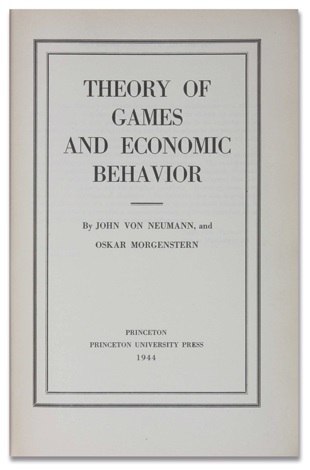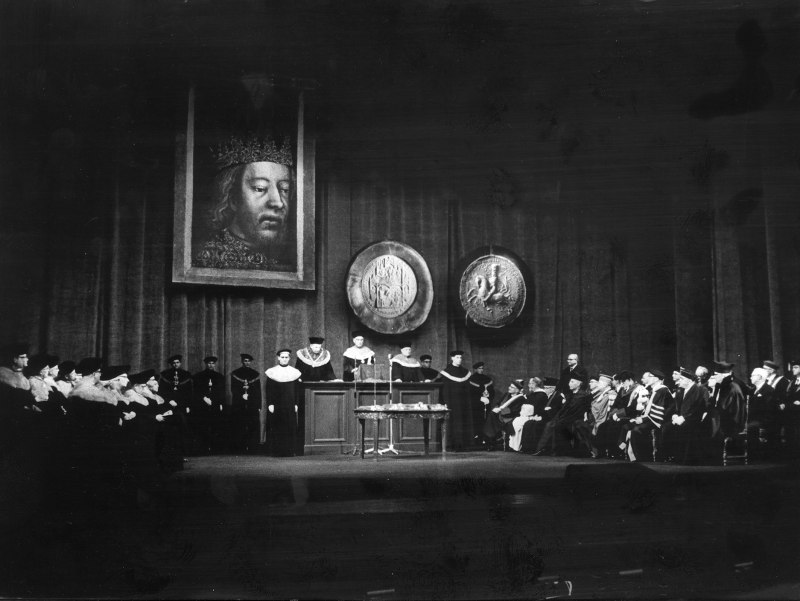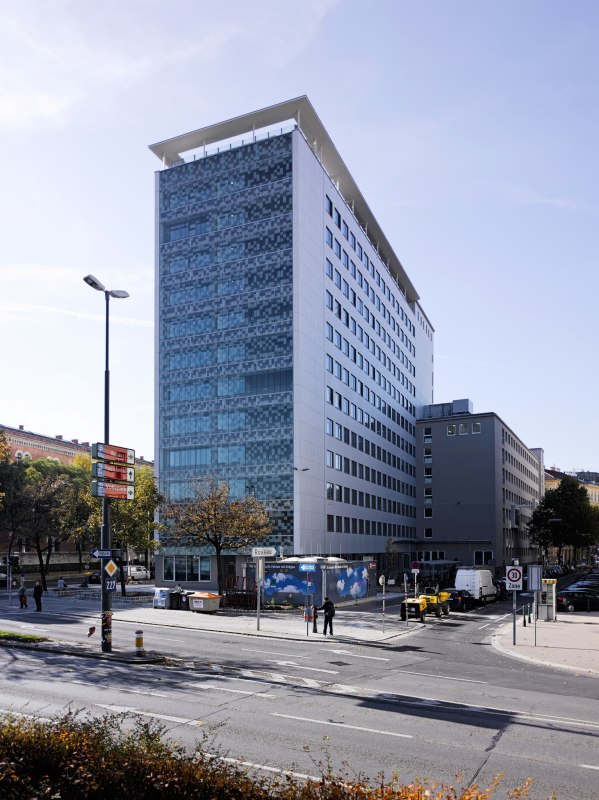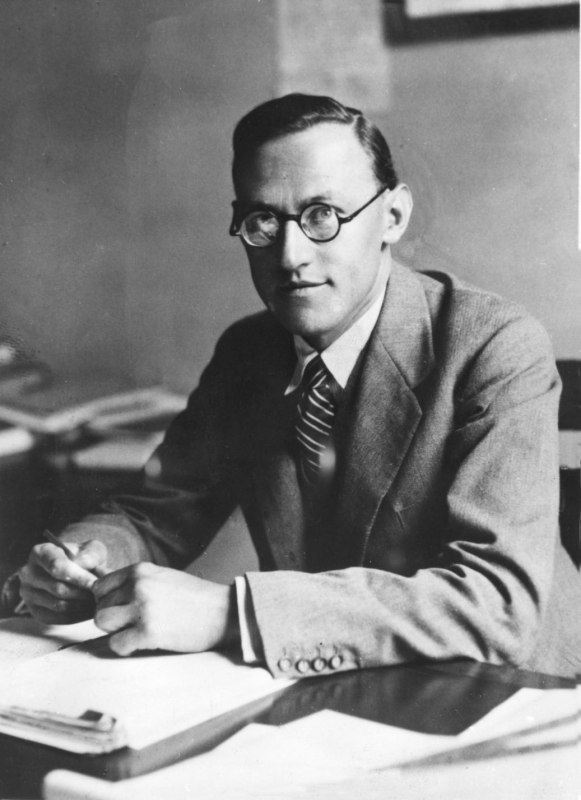Oskar Morgenstern, o. Univ.-Prof. Dr. rer. pol., Dr. jur. h.c.
Founder of the game theory together with John von Neumann, founder of the Institut für Höhere Studien together with Paul Felix Lazarsfeld
Ehrungen
| Ehrung | Titel | Datierung | Fakultät | |
|---|---|---|---|---|
| Ehrendoktorat | Dr. jur. h.c. | 1964/65 | Rechts- und Staatswissenschaftliche Fakultät |
|
| Stipendien/Preise/Stiftungen | Oskar-Morgenstern-Medaille | 2013 | Fakultät für Wirtschaftswissenschaften |
|
- Wirtschaftswissenschaften
- Nationalökonomie
- Rechts- und Staatswissenschaftliche Fakultät
Morgenstern, the son of a merchant, attended secondary school in Vienna and studied social sciences at the University of Vienna. After becoming an assistant at the chair for political economics under Hans Mayer in 1923, he obtained his doctoral degree in Vienna in 1925 and in summer subsequently became a fellow of the Laura Spelman Rockefeller Memorial. Morgenstern spent the next two years in England, the USA and Canada, mainly being active at Columbia University in New York and Harvard University in Cambridge. There followed a research fellowship in economics at Harvard University for the academic year of 1926/27 and a fellowship for studies in Paris and Rome in 1927/28.
In 1928 he published the book “Wirtschaftsprognose, eine Untersuchung ueber ihre Voraussetzungen und Moeglichkeiten”, This work also was the foundation for his habilitation, which took place with some delay: On May 24th, 1928 the faculty admitted him to the next habilitation steps and approved his habilitation thesis. Only Othmar Spann raised objections to this and abstained from voting. Even after being prompted by the dean, he did not want to state the reasons for his objection. At the following meeting on June 16th Spann suddenly argued in favor of reconsidering the decision, although at this point the approval of the habilitation thesis already was legally valid. With Spann’s dissenting vote, the faculty nevertheless decided in favor of the admission to the examination. The dean asked Spann to hold the examination, but Spann, evidently insulted, declined without giving a reason and left the meeting. After the sample lecture the faculty voted for the application of the conferment of venia docendi with one abstention from voting (Spann). In the report to the ministry, however, Spann’s dissenting vote and his argumentation was included, in which he criticized a lack of originality in Morgenstern’s paper and accused him of „either not knowing literature he should have known or using it without citation“. According to Spann, the habilitation would not be „beneficial to the academic reputation of the faculty“. In contrast to this assessment stood two positive reviews by Hans Mayer and Ferdinand Degenfeld-Schonburg. The dissenting vote nevertheless had an impact, since half a year later the ministry still had not given its approval.
In December 1928 the dean’s office renewed the application and urged a quick decision. In Morgenstern they saw a „figure well recognized abroad“. Hans Mayer had earlier talked about a „severe affront and ideational damage, warranted by neither the excellent professional achievements, nor by the outstanding personal qualities of this young intellectual already well known around the world“. He continued that it had become known to the faculty, „that to delay or prevent Morgenstern’s habilitation and to question his personal integrity, rumors about him being a Stonemason had been spread“. Mayer even attached a declaration by Morgenstern, in which he denied the „accusations“. After this submission also remained unsuccessful, Degenfeld-Schonburg drafted a statement regarding Spann’s dissenting vote. It would be „strange if Morgenstern’s concept had not been noticeable in earlier literature“, but „the evidence presented by Professor Spann does not show it completely“. Lavington, for example, had not yet arrived at a „criticism of scientific economic forecasts“. Degenfeld also criticized some shortcomings, such as Morgenstern’s failure to cite Knauth and the aforementioned Lavington, however „there can be no question of plagiarism“ (as suggested by Spann). In addition, Hans Mayer, who was also vice dean, sent the ministry excellent reviews from the „Journal of Political Economy“ and the „Giornale Economisti“.
Finally also the ministry found that „Professor Spann’s isolated opinion does not offer enough reason to withhold approval of the habilitation passed by Professor Koll“. Morgenstern, at that time also a member of the theoretical committee of the „Verein fuer Sozialpolitik” (Society for Social Policy), in 1929 subsequently became private lecturer of political economy. Two years later, he succeeded Friedrich August Hayek as head of the Oesterreichisches Institut fuer Konjunkturforschung (Austrian Institute for Economic Research, later the Institut fuer Wirtschaftsforschung) and remained in this position until 1938. Expressions of his scientific renown were numerous calls for him to come abroad: After being suggested for an associate professorship at the commercial college in Koenigsberg in 1931, he declined a position at the University of Berkeley, as well as at the Institut fuer Weltwirtschaft und Seeverkehr (Institute for Global Economy and Maritime Traffic) in Kiel in 1932. Apart from his functions at the University and the Institut fuer Konjunkturforschung he also was a member of the League of Nations committee of experts for price statistics as well as the political science examination board. From 1932 on he worked as a consultant of the National Bank of Austria, and from 1936 also of the ministry of trade. As private lecturer he received the title of „associate professor“.
When the German troops marched into Austria in March 1938 and Austria became a part of the „Third Reich“ not long thereafter, Morgenstern was on a lecture tour in the United States. Because of the expected persecution, he decided to stay in the USA and not to return to Austria. On April 22nd, 1938, the ministry of education suspended his teaching license until further notice. Five months later, the ministry ultimately revoked Morgenstern‘s venia legendi, thereby also expelling him from the political science examination board.
In the very same year of his emigration, Morgenstern received an appointment to teach at Princeton University, where he became full professor in 1944. Also in that year he published one of his main works together with John von Neumann – „Theory of games and economic behavior“. Game theory for Morgenstern was an interdisciplinary field that could contribute to the resolution of economic, social, political and private conflicts. Through the co-development and practical application of game theory Morgenstern had a significant impact in the following years. Game theory is considered the first conflict-resolving theory of the social sciences, according to which the stability of a society depends on the different decision processes of many decision makers.
His achievements in game theory also won Morgenstern several advisory positions: From 1948 on he advised the Rand Corporation, from 1955 until 1957 the atomic energy commission of the United States and from 1959 until 1960 the White House. He had a noticeable impact in the conclusion of the Korean War, when – for the first time in history – a government asked game theorists for advice. Morgenstern and his colleagues compiled a 3000-times-3000 strategy matrix, which captured the game theoretical resolution of the conflict, and then calculated the ideal solution on an ENIAC-Computer. As a result, Truman decided not to cross the Yalu River and fired Commander-in-Chief MacArthur. Kennedy later appointed Morgenstern as consultant for strategic-military decisions (Polaris nuclear deterrence strategy).
Morgenstern worked at the National Bureau for Economic Research from 1940 until 1959. During that time, in 1956, he briefly returned to Europe to teach as a visiting professor in Muenster. He held another guest professorship in Basel in 1959/60. In this time Morgenstern and Paul Felix Lazarsfeld also worked toward founding the Institut fuer Hoehere Studien (Institute for Higher Studies, IHS) in Vienna, where he became a member of the academic advisory council in 1960. He planned a second „Institute for Advanced Study“ modeled on Princeton. The institute’s founding is especially significant in light of the precarious situation of the (empirical) social sciences in late 1950s Austria and the simultaneous efforts to strengthen them in Europe made by the Ford Foundation. Because of party political interests – the fear that one’s own faction would not be represented appropriately in the institute – as well as debates within the party, the constitution process moved slowly and chaotically. In the negotiations Morgenstern acted as a go-between to the OeVP (Austrian People’s Party), not least because one of the main negotiators on the OeVP-side was Reinhard Kamitz, who succeeded Morgenstern as head of the Institut fuer Konjunkturforschung.
The institute was finally opened in the fall of 1963. In accordance with the widespread proportional representation of the large parties in Austria, it had two director’s seats. Renowned scientists such as James Coleman, Karl Menger and Gerhard Tintner received positions as guest professors, but at the same time the institute operated under some questionable practices. Coleman for example criticized that assistant positions were given away according to party memberships and that these assistants earned more at the well funded IHS than university professors, even if they worked full time on the side. Only at the end of the 1960s, after the retirement of Ernst Florian Winter as director in 1968 and the appointment of the statistician Gerhart Bruckmann, did one „at least get close to the original ideas of the American founders, financiers and advisers“ according to Fleck. Morgenstern had headed the institute for a year from September 1965 onward and stayed a member of the advisory board until his death in 1977. After his time as director of the IHS he was scientific adviser and staff member at the Oesterreichisches Institut fuer Konjunkturforschung.
Finally, in 1970, Morgenstern was given emeritus status at Princeton, which led to no less than six prestigious American universities trying to persuade him to join them; however no Austrian universities did the same. He would have liked to have returned to Austria – for example as an honorary professor – but instead taught another six years as Distinguished Professor in Game Theory and Mathematical Economics at New York University.
Aside from the co-development of the aforementioned game theory, Morgenstern also proved, among other things, that the maximum growth rate of a capitalist economy corresponds to the interest rate. He also gained importance through his analysis of economic time series, which he wrote about in the book “On the accuracy of economic observations” (1950). Notable are furthermore his application of spectral analysis to economic time series as well as his „Random Walk Hypothesis“, a risk analysis that takes into account the probability or uncertainty of decisions. Morgenstern always stayed true to the Austrian school of national economy.
He was co-publisher of the “Zeitschrift fuwr Nationaloekonomie” (Journal for national economy, from 1956), the “Zeitschrift fuer Wahrscheinlichkeitstheorie” (Journal for probability theory, from 1962), the journal “Decision and Control“ (from 1965), and the “International Journal of Game Theory“ (from 1970). Furthermore he was director of the Economic Research Program from 1955 to 1970 and from 1958 president of the Vereinigung Mathematica and member of various other scientific societies. 1969/70 he also advised NASA. He received honorary degrees from the universities of Mannheim (1957), Basel (1960) and Vienna (1965). In the time before the „Anschluss“, he also had been a board member of the Nationaloekonomische Gesellschaft (Austrian Economic Association).
On November 27, 2012 the square in front of the new adapted building for the faculties for economics and for mathematics - Universitaet Wien Rossau - in Viennas 9th district was named "Oskar-Morgenstern-Platz" (Rossauer Laende 3). On the occasion of the move of the Faculty of Business, Economics and Statistics into the new buildung it presented the new-founded "Oskar Morgenstern-Award" for the first time in October 2013.
Archiv der Universität Wien, Rektoratsakten GZ 677-1937/38.
Archiv der Universität Wien, Senat S 199.3.7 (Morgenstern, Oskar: Verleihung des Ehrendoktorats).
Österreichisches Staatsarchiv/Allgemeines Verwaltungsarchiv, Personalakt Morgenstern.
Zuletzt aktualisiert am 25.01.2024 - 23:11
-

John von Neumann and Oskar Morgenstern “Theory of Games and Economic Behavior”, 1944. The book became the “bible” of game theory.
-

Honorary graduation during the 600th anniversary of the University of Vienna, Burgtheater Vienna, 1965
Verleihung der Ehrendoktorate an Hubert Jedin und Roland de Vaux (Katholisch-Theologische Fakultät), Ernst Wolf und Ladislaus Marton Pákozdy (...
-

Building of the faculties of of Business, Economics and Statistics at Oskar-Morgenstern-Platz, Vienna
-

Awarding of the Oskar-Morgenstern-Medaille to Roger Myerson by former rector Georg Winckler, rector Heinz W. Engl and dean Oliver Fabel
Verleihung der Oskar-Morgenstern-Medaille an Roger Myerson durch Altrektor Georg Winckler , Rektor Heinz W. Engl und Dekan Oliver Fabel

